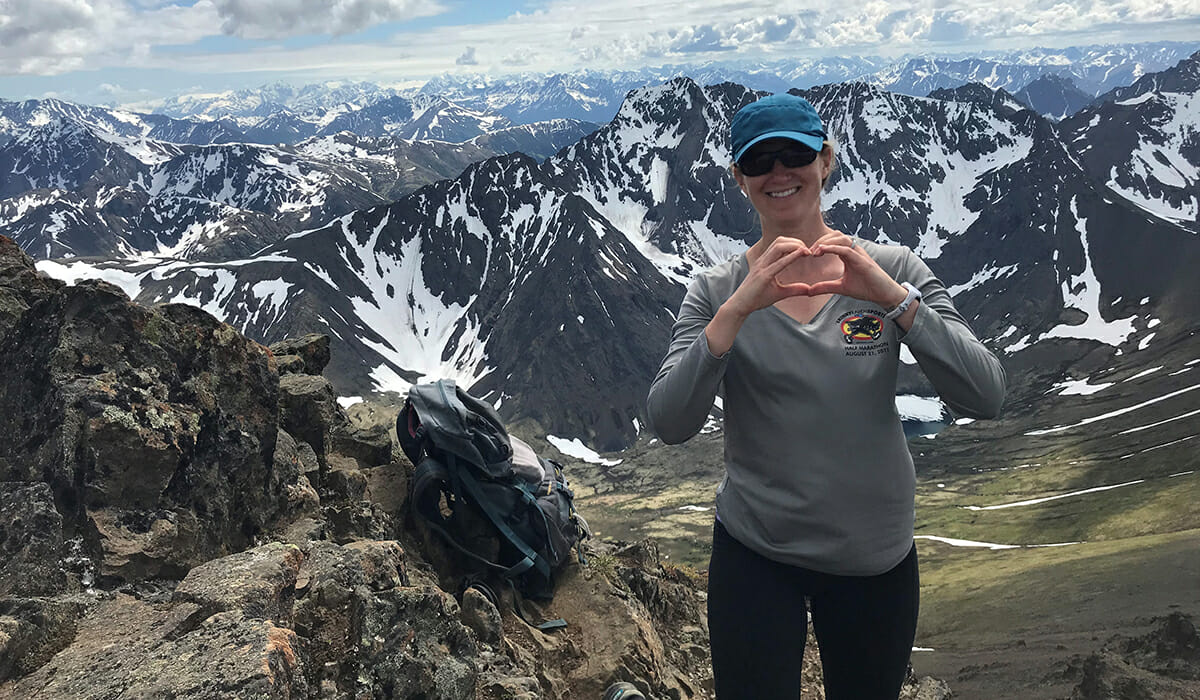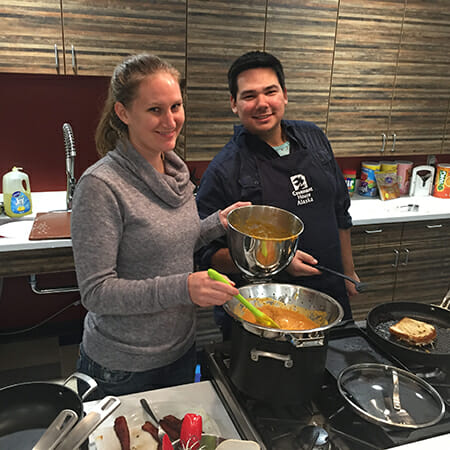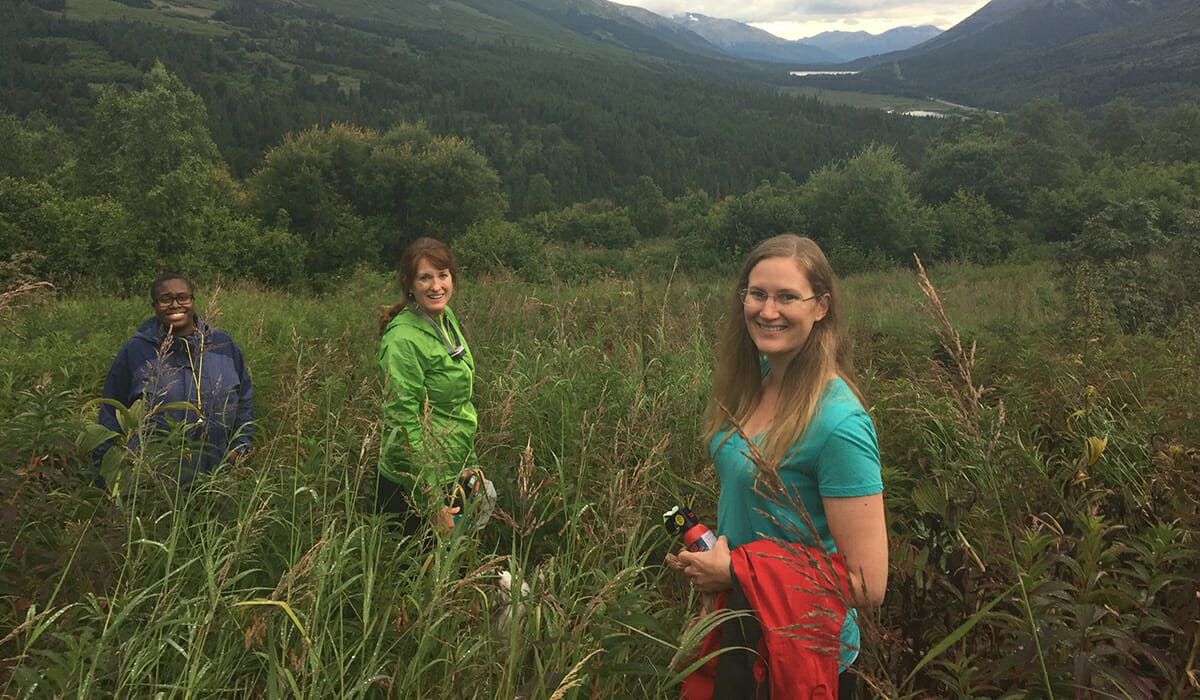Volunteer Helps Mentor Anchorage’s Homeless Youth

Meet Daily Point of Light honoree Ginger Kane. Read her story and nominate an outstanding volunteer or family as a Point of Light.
Four years ago, Ginger Kane was looking for ways to give back to her Anchorage, Alaska community when an opportunity arose through her work to help with Christmas gift wrapping at Covenant House Alaska, a nonprofit organization that provides housing and services to homeless youth. While volunteering that day, Ginger realized Covenant House Alaska was the right match for her to fulfill her desire to help out. Ever since, she has served as a mentor for Covenant House Alaska through their Rights of Passage program, a transitional living program for young adults to learn essential life skills.
Ginger, who also works full time and is a mother of two, offers one-on-one mentoring and additionally hosts events for all of the program’s participants. She started an annual cooking night every Thursday, where anyone can come learn cooking skills while also talking to Ginger about what’s going on in their lives or anything they need help with. She also frequently plans hikes and attends camping trips with the program’s young people, among other events. Ginger said working with young people and seeing them overcome the challenges in their lives has been both gratifying and inspiring for her.
Describe your volunteer role with Covenant House Alaska.
Covenant House is a nonprofit organization that provides short- and longer-term housing for homeless youth in Anchorage. They also provide services and link them up with different community resources. In Anchorage, they have three main branches. They have what would be termed an emergency shelter, and that’s their biggest program. Then they have a program for either recent or expectant mothers. There’s a Rights of Passage program, which is up to a two-year program for students in the age range of 18 to 22, to support them gaining the life skills they need to be a functioning adult in society. That’s the program I work with.

What do you do within that program?
I fulfill a role called mentor, and what the mentors are meant to do is help provide an outside sounding board or provide guidance to the youth as they’re navigating this next life step and becoming adults, and kind of provide them with the perspective of a functioning adult and what that looks like. … I would be matched up with a specific youth and can provide regular help and guidance. Also, additionally I can help the program in general and go to their location and either be there or provide some life skills. Typically what that would look like for me specifically, is I like to cook a lot so I’ll go there and bring a recipe and the ingredients. I was doing it weekly, which would be every Thursday, so the kids would know that Thursday night there’s an opportunity if you want to come and either hang out or help cook. It’s provided that life skill of how to cook, but also somebody that’s there week to week to week, who can chat and hear what’s going on in your life … and be that excited person in their life when they have an accomplishment or try at something.
Then I’ve gone on hikes regularly with folks who want to get out hiking. … You’re focused on hiking and then there’s an end goal and you can reach that goal. It’s exciting and really fun. The kids, you can see them physically lighten up. They’re not focused on their daily grind. They can just focus on something else for a hot minute. Then of course, with the one-on-one mentorship role, we’ll go out for lunches to discuss what’s going on in their life. I can provide feedback or just talk about things and go back and forth, and do things like if they need to go get an ID, we can work that in so I can take them to the DMV to go do that. Or if they need to go to Walmart to pick things up, or go get clothes for an interview, or talk about interviewing and what they’re nervous about. Maybe work through those things or what next steps should look like, or what are their goals and what are some actions we can take today toward those goals, and stuff like that.
How important is it for homeless youth to have this kind of support in their lives?
I think it’s extremely important, actually. There’s the Big Brothers Big Sisters [nonprofit organization] that gets involved at younger age, but this is where we get involved when there’s been serious trauma. [We’re] really supporting those kids who are actually experiencing homelessness, and giving them a hand up when they’re at an age where they’re wanting it and they’re really wanting to move on to that next step of life, and showing them. I think the younger and earlier you can get in and influence them, and help them get on track and get the help they need to get to their next goals, to the next step of life — of course, the earlier you can influence, the better trajectory we can put these folks on and connecting them up with skills to get jobs to be functioning members of society.
What’s been the most rewarding part of your work?
I think the most rewarding part has been being able to provide a place for kids to really relax. I’ve done camping with just a couple kids before and they’re like “Oh my gosh, just to be out in nature for awhile and not worry about all this other stuff.” It also gives a chance for them to really let go of their stress. You can also talk about things, sprinkle it in with that fun, so it’s not as stressful talking about maybe, “How do we get to the next step?” We can sprinkle it in. Also, to see them enjoying things when you normally see them stressed out and coming and going and worried about things, that is really nice and heartwarming. The hiking has been really enjoyable.
The other thing is to see kids that really turn around. When I’m cooking with them week to week and seeing them really struggling, and seeing them overcome whatever barriers they had, whether it was just a mental, creating their own barriers in life, and then finally figuring it out and clicking. There was one girl in particular — she was struggling and not really taking that next step and getting a job. Then all of a sudden, it was like week to week, she was on her job, she was looking good, she was peppy, her attitude had changed and everything. Then finally as she left the program, totally felt completely ready and set up and involved in her own life and taking those next steps. It was like night and day one week to the next. [She was] struggling weeks and weeks, and months and months. Then it was like a lightbulb went off. … She really started taking accountability for her own life now that the barriers of her life had been removed from living with her family previously. Now she could really move on from that. Watching her be able to say, “Yep, the past is the past and the only way I can move forward is taking accountability for my future and doing that” — that was really great to see. That’s just one example. There’s been multiple kids who have really been able to overcome that barrier of the struggles of the past and really be able to take accountability for their future. I can’t imagine how hard that would be and I can totally understand struggling for a long period of time. When they do make that click and let go of what’s been holding them back, and are like “Ok, let’s work on the future” and “My future is bright” and “Let’s go get it” — it’s really cool.

What have you learned through your experiences as a volunteer?
I’ve learned that homelessness is a really complex deal. It’s given me a much greater understanding and much greater compassion for when someone is struggling. What you see on the outside, there is probably more down deep. … If somebody is not able to get up everyday at 8am to go to work, it wouldn’t be the same reason if I were to not get up at 8am. These folks have more barriers to doing that. Recognizing that and being compassionate about how can I help, instead of maybe just ragging on the outer problem, and how can I fix the barriers to that. Then just seeing that it is fun and I do have something to offer. Showing up is important, and then showing up and showing just who I am is also important, which is certainly not perfect. I think showing the silly things that I do and showing that I mess up cooking recipes all the time, but you still have to cook and you have to move forward — if you make mistakes it’s ok, it can be fun, it can be funny to make mistakes and you’re going to continue making them for a long time and you can still be successful while making mistakes — I think is a really good thing.
Why do you think it’s important for others to give back?
I think that the community is as strong as everyone wants to make it. As a member of the community, [if] I want a strong and healthy and vibrant community, then everyone needs to give back as much as they are capable. That will mean different things at different points in your life, but if everyone gives back as much as they can, then that will make for a very strong community. That might mean sometimes you’re not giving anything back. Sometimes you’re taking. Then once you can give, you can give maybe even a small amount. Maybe it’s money. Maybe it’s time. Maybe it’s just not being a burden, just you doing your part in the community. If everyone does that, then that makes for a strong community which is important for everyone.
Do you want to make a difference in your community like Ginger? Find local volunteer opportunities.
